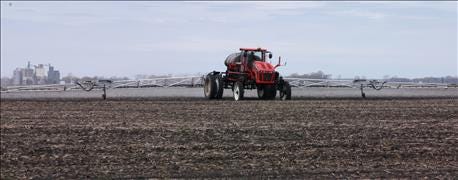February 1, 2016

What’s the best way to control foxtails barley?
Can you use industrial grade hydrogen peroxide as a spray water conditioner?
Does the mosquito repellant DEET kill weeds?
Richard Zollinger, North Dakota State University Extension weed specialist, answers those questions in this edition of Weed Q&A.
Question: What chemical options will control foxtail barley in rangeland, pasture, and non-crop areas? In cropland?

A farmers applies herbicide to a corn field prior to planting.
Answer: If rangeland, pasture and non-crop areas areas do not contain desirable grass species then a clethodim product (Select) or Assure II applied to plants in the tiller stage and especially before plants head out will be successful. If the areas contain desirable grass species then Plateau is labeled for control. It is important to follow label direction to apply at the proper timing, to use recommended adjuvants, and follow other label information.
Question: Some growers are looking at using industrial grade hydrogen peroxide as a water conditioner to replace ammonium sulfate under the assumption that it will “fix” hard water and offer uptake into the plant. They will be mixing it (at a 1 quart use rate) with the herbicides, insecticides, and fungicides in all their crops except for wheat. One grower in particular has been using industrial grade hydrogen peroxide for a few years and says he’s seen better herbicide efficacy. He also uses it as a “fungicide” in his wheat at heading and for cercospora control in sugarbeets. Is there any validity to these statements?
Answer: I do not know the effect of hydrogen peroxide on insecticides and fungicides. Ammonium sulfate (AMS) is viewed as the standard for all water conditioning adjuvants. The sulfate in AMS ‘fixes’ water by binding with the antagonistic mineral (Ca, Na, Mg, Fe, etc). The ammonia has an equally important role as sulfate - by increasing absorption and translocation of weak acid herbicides. Weed scientists have found most water conditioners that do not contain any AMS are less effective than those that contain AMS – this includes hydrogen peroxide. Hydrogen peroxide (H2O2) does not have any sulfate or phosphate to bind antagonistic minerals nor does it have any nitrogen or ammonia to enhance absorption and translocation of herbicides. Hydrogen peroxide may have some other effect of helping herbicide through leaf barriers like the cuticle but it does not have components that condition water (sulfate) or enhance absorption and translocation through binding with nitrogen contained in fertilizer products.
Your comment that the grower says “he’s seen better herbicide efficacy” using industrial grade hydrogen peroxide. Better efficacy than what - no hydrogen peroxide? To make that statement valid, the grower spray should spray part of the field with just the herbicide, then another part of the field with the herbicide and hydrogen peroxide. To determine if hydrogen peroxide “fixes” water the grower should also spray another part of the field with the herbicide plus current standard of AMS at 8.5 pounds per 100 gallons of water.
Question: Word around the local coffee table, is that using a 40% Deet insect repellent kills weeds… A producer is “experimenting” with it in his lawn and he showed me that it does work. It killed the dandelions, lambsquarters, common mallow, etc. The grass surrounding the weeds looks like it was killed too. However, my question is, will anything grow back at all after it has been sprayed with a 40% Deet?! Is it the Deet that’s killing the plant?
Answer: DEET, the active ingredient in most mosquito repellant, will burn the foliage of most any plant and if sprayed with a heavy dose can completed desiccate even large plants. Years ago growers would spray milkweed with mosquito repellant containing DEET and it would quickly burn the plants down to the ground. Milkweed plants would soon after send up new shoots. Years ago one of the major chemical companies investigated developing DEET as a herbicide but as I recall was too expensive to manufacture and formulate and efforts to register the active ingredient was discontinued
The herbicidal action of DEET is contact and can be considered similar to any contact herbicide like paraquat, Liberty, Cobra, etc. It has limited translocation in the plant so any of the growing points not injured by the spray will develop branches and regrowth will occur. If annual plants are sufficiently covered with the spray then the plants will die but perennial plants like lawn grass, milkweed, and dandelion will grow back from perennial underground roots.
Source: North Dakota Crop and Pest Report
You May Also Like




